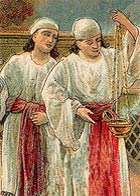Leviticus

Tomorrow, synagogue-goers will hear the final yearly readings from the biblical Book of Leviticus (in Hebrew, Vayikra). As every year, they will no doubt reflect on what is in some ways the most challenging and mind-bending volume of the Torah.
The books flanking Leviticus on either side easily comport with what we usually think of as "religious literature." The two before it, Genesis and Exodus, tell stories of creation, family and nation-building, enslavement, exodus, and revelation. Of the two after it, Numbers offers morality tales of the wilderness and Deuteronomy gives us poetry, prophecy, and detailed ethical-legal teachings. By contrast, Leviticus dwells at length on animal sacrifices, on leprosy and other disfigurements, on dietary and sexual taboos, on rules for the sabbatical and jubilee years, ending with a bang of fire-and-brimstone imprecation.
The same sages who canonized the other biblical books canonized Leviticus. Why? To many 19th-century Christian scholars, conditioned by Protestantism to reject ritual and taboo as foreign to religious conscience and spirituality, Leviticus epitomized the decadent legalism and ritualism—the "Pharisaism"—that the New Testament sought to displace. But more recent scholars have come to see things differently.
They have done so by focusing precisely on the strangest part of Leviticus of all, "the Holiness Code" at its heart (chapters 17–26). There we find, in one breath, exalted moral pronouncements ("Love your neighbor as yourself," 19:18, being only the most famous) alongside exacting prescriptions for ritual purity and impurity, sexual behavior, and other rituals.
A great step forward in entering the ancient thought-world was taken by the British anthropologist Mary Douglas in a landmark 1966 essay. To her, what may seem to be a series of bizarre and unconnected rituals and taboos actually displays a compelling internal logic and ethic; they are, she wrote, building blocks of holiness, which in biblical terms means wholeness, completeness, and thus godliness.
After Douglas, Jewish and non-Jewish scholars alike have been better able to read Leviticus—and to criticize it, where they have felt compelled to do so, on its own terms. Jacob Milgrom and, lately, Jonathan Klawans have explicated the prescriptions of the Holiness Code as highlighting the search for the divinely mandated order that permeates the human and natural worlds. To Israel Knohl, rather than regressing from Sinai by restricting holiness to the priestly order, Leviticus strives to transform the moment of revelation into a living reality that enables all, in their moral, spiritual, and physical lives, to participate in the divine.
Through whichever lens one reads Leviticus—rabbinic tradition, historical scholarship, feminist critique, or Jewish theology—its strangeness, its provocative defiance of conventional categories, abides. Isn't this unsettling of the familiar, shouldn't it be, the essence of religion itself?
Comments are closed for this article.




